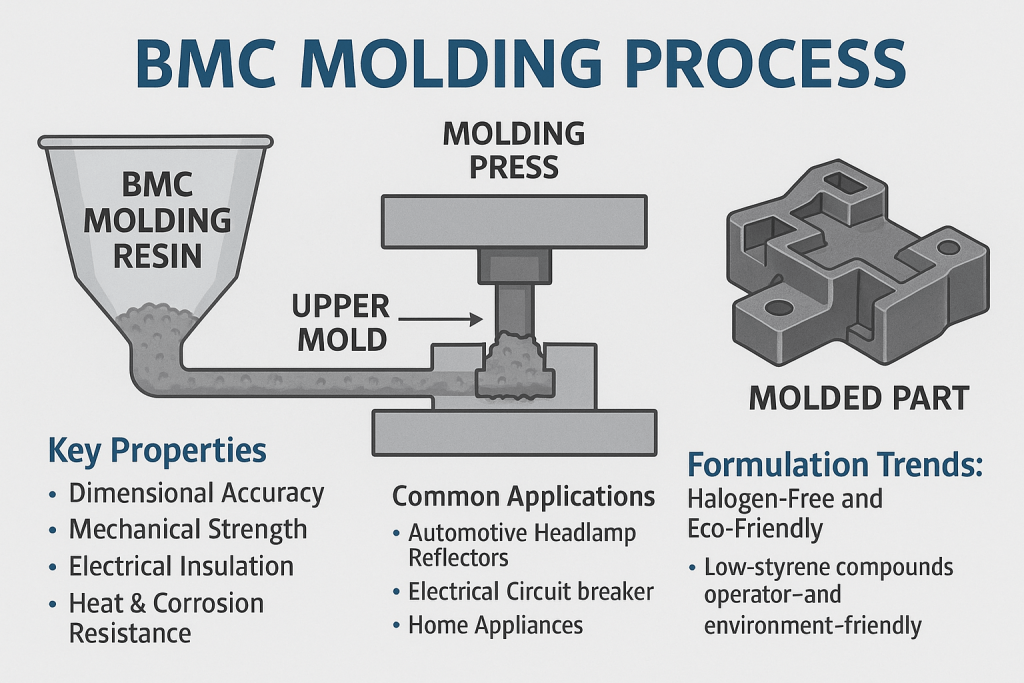In the world of advanced composites, Bulk Molding Compound (BMC) resin is a name that continues to gain traction. Known for its excellent flowability, mechanical strength, electrical insulation, and thermal stability, BMC resin has become a foundational material in a range of industries—from automotive and electrical to sanitary ware and consumer appliances.

What is BMC Molding Resin?
BMC is a ready-to-mold, glass-fiber reinforced thermosetting plastic composite, composed of:
- Unsaturated polyester resin (as the matrix)
- Chopped glass fibers (6–12 mm)
- Mineral fillers (like calcium carbonate or ATH)
- Curing agents and performance additives
BMC materials are typically compression or injection molded, allowing for complex shapes, tight tolerances, and high-volume production.
Why is BMC Resin So Widely Used?
1. Dimensional Accuracy
BMC resin offers excellent moldability and shrink control, enabling intricate component design without post-processing.
2. Mechanical Strength
The combination of polyester matrix and fiber reinforcement provides exceptional stiffness, impact resistance, and fatigue performance.
3. Electrical Insulation
BMC is inherently insulating, flame-retardant, and resistant to tracking and arcing, making it ideal for high-voltage electrical applications.
4. Heat Resistance
Depending on the formulation, BMC can maintain performance in temperatures exceeding 150°C, suitable for engine compartments and motor housings.
5. Corrosion and Moisture Resistance
Unlike metals, BMC does not rust or degrade in wet or chemically aggressive environments, supporting long-term durability in plumbing or outdoor components.
Common Applications of BMC Resin
| Sector | Typical Components |
| Automotive | Headlamp reflectors, under-the-hood cover |
| Electrical | Circuit breaker housings, terminal blocks |
| Sanitary Ware | Faucet bodies, toilet seats, shower trays |
| Home Appliances | Motor covers, fan blades, microwave insulators |
| Infrastructure | Water meter enclosures, junction boxes |
Formulation Trends: Halogen-Free and Eco-Friendly
As environmental regulations (RoHS, REACH) tighten, halogen-free flame-retardant BMC resins are gaining popularity. These formulations reduce smoke toxicity and are better suited for enclosed public environments like subways, trains, and smart homes.
Additionally, innovations in low-styrene or styrene-free BMC formulations are being developed to reduce emissions during production and molding—making them more operator- and environment-friendly.
Performance Standards
BMC molding resin typically meets or exceeds the following international standards:
- UL 94: V-0, V-1 flame retardancy
- IEC 60695: Glow wire testing
- ASTM D792: Density and water absorption
- ISO 178/179: Flexural and impact strength
Meeting these certifications is crucial for manufacturers serving the electrical, automotive, and construction markets.
Industry Insight
While BMC resin has been used for decades, its evolving formulations and versatility are keeping it highly relevant in today’s innovation-driven manufacturing landscape. With the rise of electric vehicles, smart infrastructure, and sustainable construction, demand for cost-effective, lightweight, and flame-resistant materials is stronger than ever.
Zhongtritium, as a leading manufacturer of unsaturated polyester resins and BMC-grade molding systems, continues to support global manufacturers with consistent quality, technical customization, and high-volume supply capacity.
Want to learn more about BMC molding resin formulations or application strategies?
Contact our technical team now!
